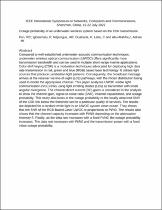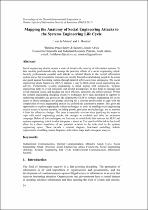 ResearchSpace
ResearchSpace
Multilingualism and augmentative and alternative communication in South Africa – Exploring the views of persons with complex communication needs
JavaScript is disabled for your browser. Some features of this site may not work without it.
- ResearchSpace
- →
- Research Publications/Outputs
- →
- Journal Articles
- →
- View Item
| dc.contributor.author |
Tönsing, KM

|
|
| dc.contributor.author |
Van Niekerk, K

|
|
| dc.contributor.author |
Schlunz, Georg I

|
|
| dc.contributor.author |
Wilken, Ilana

|
|
| dc.date.accessioned | 2019-07-23T11:40:48Z | |
| dc.date.available | 2019-07-23T11:40:48Z | |
| dc.date.issued | 2019-04 | |
| dc.identifier.citation | Tonsing, K.K., Van Niekerk, K., Schlunz, G.I. and Wilken, I. 2019. Multilingualism and augmentative and alternative communication in South Africa – Exploring the views of persons with complex communication needs. African Journal of Disability, 13pp. | en_US |
| dc.identifier.issn | 2223-9170 | |
| dc.identifier.uri | http://www.scielo.org.za/scielo.php?script=sci_arttext&pid=S2226-72202019000100008 | |
| dc.identifier.uri | http://dx.doi.org/10.4102/ajod.v8i0.507 | |
| dc.identifier.uri | http://hdl.handle.net/10204/11036 | |
| dc.description | Copyright: 2019 AOSIS. This is the fulltext version of the work. | en_US |
| dc.description.abstract | Background: Augmentative and alternative communication (AAC) can assist persons with complex communication needs to communicate competently with a variety of communication partners in a variety of contexts. However, AAC systems and intervention often do not take multilingual aspects into consideration. Objective: This small-scale exploratory study had three aims, namely: (1) to describe the selfreported language skills of multilingual South African adults using AAC, (2) to describe the languages and communication modalities they used in interaction and (3) to obtain their views regarding access to various languages. Methods: Twenty-seven adults using AAC were recruited via an empowerment programme, as well as an email list for persons interested in AAC, and provided responses to a questionnaire. To compensate for access and written language challenges, the questionnaire was administered with help and/or as a face-to-face interview where needed. Responses were analysed using mostly descriptive statistics. Results: Participants generally could not express themselves in all the languages they understood and were regularly exposed to. Speech-generating devices specifically gave access almost exclusively to English. Participants expressed a desire to increase their expressive language repertoire, and mentioned both limitations of communication technology as well as their own literacy skills as barriers to overcome in this regard. Conclusion: In order for multilingual South African adults using AAC to express themselves in multiple languages, appropriate AAC systems and interventions as well as literacy learning opportunities need to be developed and provided. | en_US |
| dc.language.iso | en | en_US |
| dc.publisher | AOSIS | en_US |
| dc.relation.ispartofseries | Worklist;22469 | |
| dc.subject | Augmentative and alternative communication | en_US |
| dc.subject | Multilingualism | en_US |
| dc.subject | Complex communication needs | en_US |
| dc.subject | Language and communication skills | en_US |
| dc.title | Multilingualism and augmentative and alternative communication in South Africa – Exploring the views of persons with complex communication needs | en_US |
| dc.type | Article | en_US |
| dc.identifier.apacitation | Tönsing, K., Van Niekerk, K., Schlunz, G. I., & Wilken, I. (2019). Multilingualism and augmentative and alternative communication in South Africa – Exploring the views of persons with complex communication needs. http://hdl.handle.net/10204/11036 | en_ZA |
| dc.identifier.chicagocitation | Tönsing, KM, K Van Niekerk, Georg I Schlunz, and Ilana Wilken "Multilingualism and augmentative and alternative communication in South Africa – Exploring the views of persons with complex communication needs." (2019) http://hdl.handle.net/10204/11036 | en_ZA |
| dc.identifier.vancouvercitation | Tönsing K, Van Niekerk K, Schlunz GI, Wilken I. Multilingualism and augmentative and alternative communication in South Africa – Exploring the views of persons with complex communication needs. 2019; http://hdl.handle.net/10204/11036. | en_ZA |
| dc.identifier.ris | TY - Article AU - Tönsing, KM AU - Van Niekerk, K AU - Schlunz, Georg I AU - Wilken, Ilana AB - Background: Augmentative and alternative communication (AAC) can assist persons with complex communication needs to communicate competently with a variety of communication partners in a variety of contexts. However, AAC systems and intervention often do not take multilingual aspects into consideration. Objective: This small-scale exploratory study had three aims, namely: (1) to describe the selfreported language skills of multilingual South African adults using AAC, (2) to describe the languages and communication modalities they used in interaction and (3) to obtain their views regarding access to various languages. Methods: Twenty-seven adults using AAC were recruited via an empowerment programme, as well as an email list for persons interested in AAC, and provided responses to a questionnaire. To compensate for access and written language challenges, the questionnaire was administered with help and/or as a face-to-face interview where needed. Responses were analysed using mostly descriptive statistics. Results: Participants generally could not express themselves in all the languages they understood and were regularly exposed to. Speech-generating devices specifically gave access almost exclusively to English. Participants expressed a desire to increase their expressive language repertoire, and mentioned both limitations of communication technology as well as their own literacy skills as barriers to overcome in this regard. Conclusion: In order for multilingual South African adults using AAC to express themselves in multiple languages, appropriate AAC systems and interventions as well as literacy learning opportunities need to be developed and provided. DA - 2019-04 DB - ResearchSpace DO - 10.4102/ajod.v8i0.507 DP - CSIR KW - Augmentative and alternative communication KW - Multilingualism KW - Complex communication needs KW - Language and communication skills LK - https://researchspace.csir.co.za PY - 2019 SM - 2223-9170 T1 - Multilingualism and augmentative and alternative communication in South Africa – Exploring the views of persons with complex communication needs TI - Multilingualism and augmentative and alternative communication in South Africa – Exploring the views of persons with complex communication needs UR - http://hdl.handle.net/10204/11036 ER - | en_ZA |








